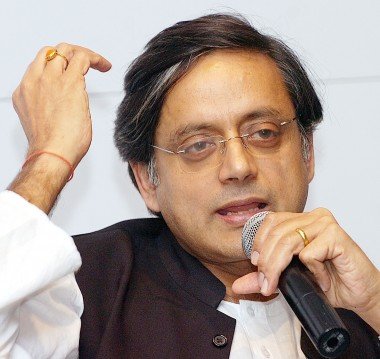Literature
Modi's talent for sound-bytes not matched by action: Tharoor's new book

New Delhi, Jan 25
Prime Minister Narendra
Modi's penchant for sound-bytes is not often accompanied by matching
action and his very fine speeches and liberal pronouncements appear
completely disconnected from any tangible action plan, adequate funding
or execution capacity, Congress MP Shashi Tharoor has said in his new
book.
"India Shastra - Reflections on the nation in our
time"(Aleph, 473 pp, Rs.695), is a collection of 100 articles and essays
that seek to convey a portrait of contemporary India.
Tharoor,
the MP from Thiruvananthapuram and a former junior minister in the
government of prime minister Manmohan Singh, says in the introduction
that Modi's speeches and sound bytes since assuming office last May
could certainly have been scripted by a liberal, though the gap between
articulation and implementation remains currently wide enough "to drive a
rath through".
"What can one make of a man who speaks of
tolerance and accommodation while condoning hate speech by party members
he has appointed as ministers? How does one interpret a PM who speaks
of 'minimal government, maximum governance' but is in the process of
running the most centralised, top-down, bureaucracy-driven,
personality-cult-dominated central government since Indira Gandhi's
emergency rule," Tharoor writes.
"How can one interpret the
intentions of a prime minister elected on a promise of delivering
results, whose very fine speeches and liberal pronouncements appear
completely disconnected from any tangible action plan, adequate funding
or execution capacity?" he asks.
"So, the jury is still out on how much we can celebrate the 'Modi-fication' of India."
Tharoor,
a former UN under-secretary general, says Modi's speeches and rhetoric
appear to recognize and harness a vital shift from the politics of
identity to politics of performance.
"Yet, he has ridden to power
at the helm of a party, the Bharatiya Janata Party (BJP) which is
ill-suited to the challenge of delinking India's polity from the
incendiary issue of religious identity that it had built its base on."
"And
his rise to office has empowered the khaki-shorts-wearing 'cultural
organisation' the Rashtriya Swayamsevak Sangh (RSS), whose views on
every subject - economics, politics, history, culture, morality, gender
relations, even matters of appropriate dress or conduct - are totally
illiberal."
Tharoor, whose wife Sunanda was found dead in
mysterious circumstances last year, said that he was persuaded by his
close friend and publisher David Davidar to undertake the book at a
"difficult time" in his personal and political life.
In the book,
which is divided into eight chapters, Tharoor terms Modi's campaign for
the April-May 2014 Lok Sabha polls as "brilliantly organised, lavishly
funded" and says it saw Hindutva relegated to the backburner.
Tharoor,
who has authored several books and won numerous literary awards, says
that 200 days is far too soon to judge a new prime minister or his
government "but his (Modi's) initial days are encouraging".
"An
ambitious man, Modi appears to realize that if he wants to make a
success of his government, he will have to lead the nation from the
centre and not from the extreme right where he built his base in the
BJP...Just as he remade himself from a hate-figure into an avatar of
modernity and progress, he is seeking to remake the BJP from a vehicle
of Hindu chauvinism to a natural party of governance."
Tharoor
says that for an opposition MP like him, it would be churlish not to
acknowledge Modi 2.0 inclusive outreach and to welcome his more
conciliatory statements and actions.
"The moment he says or does something divisive or sectarian in the Modi 1.0 mould, we will resist him robustly."
Tharoor
says he had been attracted to Modi's oft repeated maxim 'minimum
government, maximum governance' but had "no illusions about the fact
that the prime minister's talent for sound-bytes is not often
accompanied by matching action".
Tharoor also says that Modi's language has betrayed a Hindu nationalist mindset even after becoming prime minister.
Referring
to himself being named by Modi as one of the prominent individuals to
promote the Clean India campaign, Tharoor said he was enveloped in a
political storm "over his politically unwise commitment to the prime
minister - and the nation - and taken to task by my party".
Tharoor wonders if Clean India will make a difference or go down "as one more Modi public-relations gimmick."
Referring
to Modi's visit to Washington last September, Tharoor writes that he
has "undoubtedly already a considerable presence on the world stage."
"We
should take with a fistful of salt the over-the-top pronouncements of
his being a 'rock star of diplomacy' but it is undeniable that with his
style, commanding presence and overwhelming confidence, our prime
minister has made an impact wherever he goes."
At another point,
he says that Modi is well on his way to creating a "distinctively
different prime ministership that is singularly his".
"Whether it can be leveraged to India's benefit, and not just for the PM's PR, remains to be seen," Tharoor writes.



































